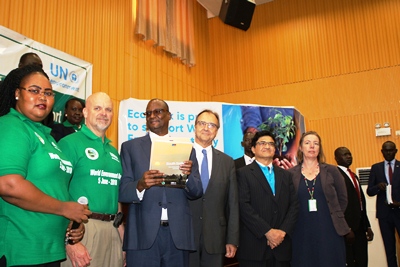Droughts, deforestation could worsen S. Sudan’s humanitarian crisis: report
June 6, 2018 (JUBA) – Competition over access to pasture, water, fuel wood, and productive farmland between pastoralists and farmers as well as communities and clans could intensify conflicts and forced migration within and beyond South Sudan, a new report indicates.

The report was officially unveiled by the United Nations Environment Program (UNEP) in partnership with South Sudan’s Ministry of Environment and Forestry other line ministries and stakeholders.
While launching the report, South Sudan’s First Vice President of South Sudan, Taban Deng Gai said the government is committed to creating more awareness so as to protect its environmental heritage.
“The government of South Sudan will take all necessary measures to ensure that the public are encouraged to be involved in the management, protection and conservation of the environment,” he said.
The official hailed the UN Environment for supporting South Sudan to launch its first state of environmental policy and the outlook report.
Acknowledging that South Sudan was struggling with environmental challenges including plastic pollution, Gai said the government has plans to address recurrent environment issues through the adaptation of reduction, reuse, recycle and resource management.
“The government will take all necessary measures to ensure participation in the management and conservation of the environment, conducts impact assessment and audit, and put in place adequate monitoring and evaluation systems,” said Gai.
“We will also adopt the 4 Rs [reduction, reuse, recycle and resource management”, he stressed.
Over 300 participants, including eight national ministers, members of the diplomatic missions, heads of UN agencies, non-governmental entities, academia, civil society organizations, media and school children attended the event held in the South Sudan capital, Juba.
South Sudan’s Minister of Environment, Josephine Napwon Cosmas urged all stakeholders including line ministries and the general public to take responsibility of the environment.
“This year’s theme invites all stakeholders to make changes to reduce the heavy burden of plastic pollution on the environment. Caring for our environment is everyone’s responsibility”, she said.
The UN Special Representative of the Secretary General, David Shearer, asked the government and partners to address the current conflict alongside the environment as some conflicts in South Sudan are as a result of competition over natural resources.
“We focus a lot on the peace agreement and building durable peace in South Sudan. However, we can’t achieve this in isolation of sustainable environment and enabling legal frameworks in place”, he said.
Meanwhile, UNEP’s director, policy and programme, Gary Lewis, pledged to support existing coordination mechanisms and provide technical skills to partners to address environmental challenges.
South Sudan is currently embroiled in a conflict that has killed tens of thousands of the population, displacing nearly two million of them.
Last year, officials from Wildlife Conservation Society (WCS) warned of dangers as the country’s wildlife and natural resources faced alarming expansion of illegal exploitation, trafficking and logging.
(ST)
